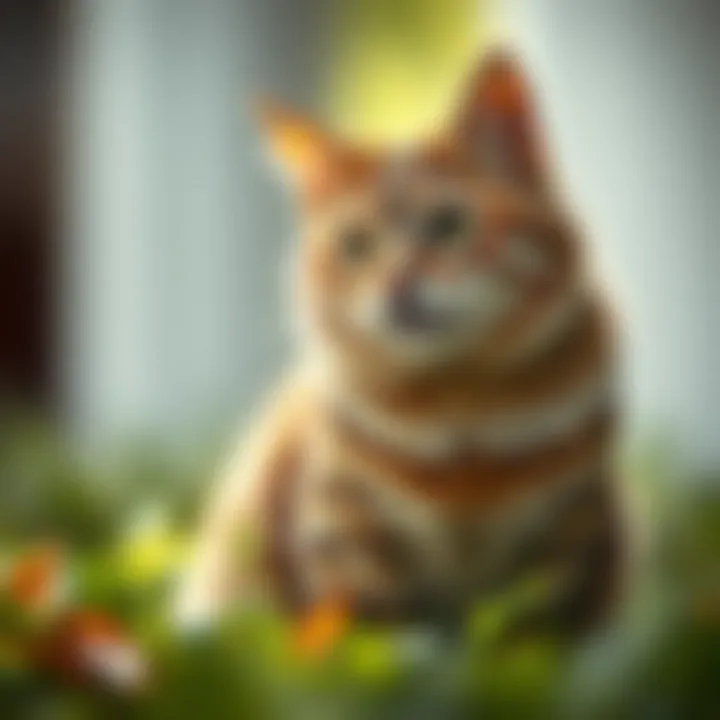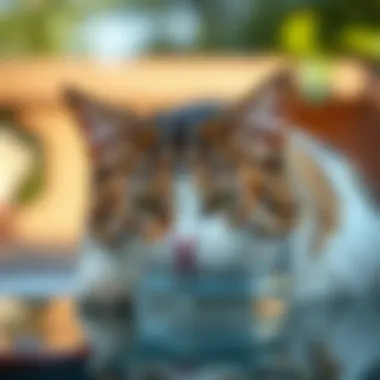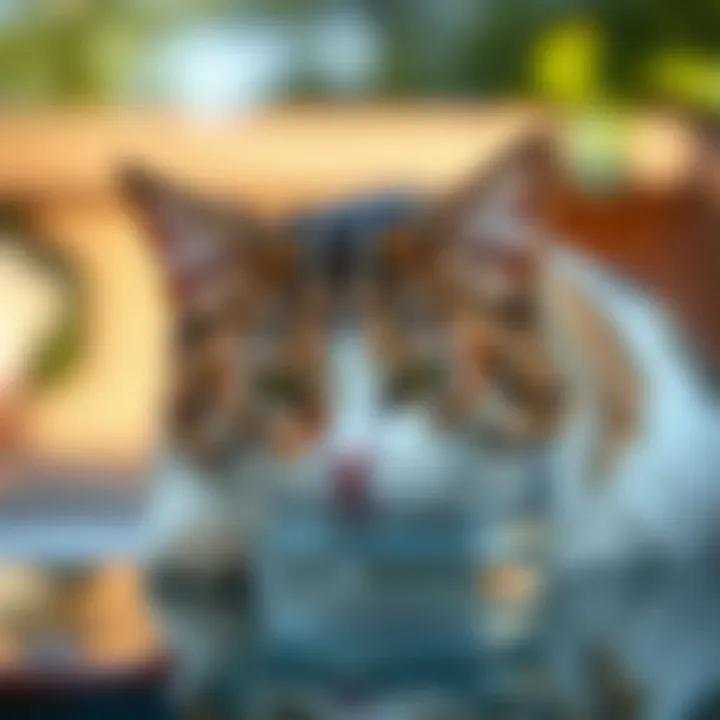Understanding Hills Urinary Feline: A Complete Overview


Intro
Taking care of our feline friends can be a daunting task, especially when they face specific health issues. One critical concern that many cat owners might encounter is urinary health. With conditions like urinary stones or bladder inflammation lurking in the shadows, it is essential to stay informed on how to best support your pet. In this guide, we’re diving into Hills Urinary Feline—an important dietary option designed specifically for cats struggling with urinary concerns.
Understanding urinary issues in cats is akin to piecing together a puzzle. It’s not merely about finding the right food; it also involves recognizing the potential causes behind these problems and addressing them holistically. Not all cat foods are made alike, and Hills Urinary Feline stands out thanks to its targeted nutritional composition aimed at promoting urinary health and overall well-being.
This article will explore the nutritional benefits of Hills Urinary Feline, the underlying causes of urinary problems, and the best practices for incorporating this specialized diet into your pet care routine. As we dissect these elements, pet owners will gain invaluable insights to manage their cats’ urinary health with confidence.
So, whether your kitty already faces urinary issues or you simply want to stay ahead of the curve, let’s navigate this journey together and equip you with the knowledge essential for your pet's health and happiness.
Preamble to Hills Urinary Feline
Understanding feline urinary health is more than just keeping your cat comfortable; it's a matter of ensuring their overall well-being. Hills Urinary Feline emerges as a key player in this journey. Its specialized formulation is designed specifically to address urinary issues that numerous cats face today. With a rising incidence of urinary tract disorders, this diet is not just a trend; it’s a necessity for many pet owners seeking to improve their cat’s health.
What is Hills Urinary Feline?
Hills Urinary Feline is a dietary solution tailored for cats prone to urinary concerns. At first glance, one might think it merely represents another cat food brand in a sea of others, but that couldn’t be further from the truth. This diet stands out due to its carefully crafted nutrient composition aimed at maintaining a healthy urinary tract. It’s formulated with controlled mineral levels that help reduce the potential for crystal formation in the urinary system. Its unique blend includes vital ingredients that work harmoniously to address both prevention and management of urinary issues. This isn’t just about feeding your cat; it’s about providing a measured approach to a common feline ailment.
Understanding Urinary Health in Cats
Many pet owners might overlook the importance of urinary health, assuming it’s just part of being a cat. However, a healthy urinary system is critical for a cat's survival and comfort. Cats can suffer from various urinary issues, like struvite or calcium oxalate crystals, urinary tract infections, and even more serious conditions like blockages. Factors such as diet, hydration, and genetics all play a role in a cat’s risk for these conditions.
Ensuring that our feline friends have balanced diets and optimal water intake can significantly affect their urinary health. Cats' natural instinct to hunt and drink from running water sources means many of them don’t consume sufficient fluids when eating dry food. Hills Urinary Feline is designed not only to make meals appealing but to encourage better hydration, addressing one of the root causes of urinary problems. This makes Hills Urinary Feline an asset in any pet owner’s toolkit, offering peace of mind as well as tangible health benefits for our beloved pets.
“Many cat owners don’t realize that a simple dietary adjustment can make a world of difference in their cat's health.”
In summary, diving into the world of Hills Urinary Feline opens a new path for managing feline urinary health concerns. It’s essential for both the condition itself and the relationship between diet, hydration, and overall wellness in cats—a relationship that deserves careful attention from pet owners. Understanding this topic not only enhances awareness but also enriches the decisions made for our furry companions.
Common Urinary Issues in Cats
When it comes to our feline friends, urinary health is something that often flies under the radar for many pet owners. However, understanding the common urinary issues that can affect cats is vital for ensuring their overall well-being and long-term health. Learning about these issues not only helps safeguard against potential problems but also serves as a reminder that prevention can often be more effective than treatment.
Types of Urinary Disorders
There are several urinary disorders that commonly affect cats. These can range from mild to severe, and their root causes often differ. By familiarizing ourselves with the various types, we can better recognize the signs and intervene early when necessary.
Feline Idiopathic Cystitis
Feline Idiopathic Cystitis (FIC) is a painful inflammation of the bladder with no identifiable cause. A hallmark characteristic of FIC is that it can strike seemingly healthy cats without any visible markers of illness. FIC is particularly relevant in this discussion because it highlights how stress, environment, and even diet can significantly influence urinary health. The main challenge with FIC is its unpredictability; affected cats might experience sudden episodes of pain and distress, which can lead to a potentially vicious cycle of behavioral stress.
From a dietary perspective, managing FIC requires careful attention. This is where Hills Urinary Feline can become a part of the strategy. By providing balanced hydration and reducing stress on the urinary system, this specialized diet could potentially minimize the occurrence of FIC episodes. However, more research is needed to understand fully how diet interplays with this complex condition.
Urolithiasis
Urolithiasis refers to the formation of urinary stones, or crystals, within the urinary tract, which can lead to blockages or severe discomfort. This condition is a significant health risk for cats. It’s characterized by the build-up of minerals that solidify in the bladder; these stones can range from small grains to large, painful obstructions. Diagnosing urolithiasis often involves imaging studies, where a vet can visualize these formations and recommend treatment.
The relevance of urolithiasis in the context of this article lies in its dietary connections. A particular concern is the mineral imbalances influenced by conventional diets. Hills Urinary Feline addresses this by controlling mineral levels to encourage dilute urine, thereby reducing the chances of crystal formation. However, if not managed correctly, urolithiasis can lead to surgical intervention, which highlights the importance of diet alongside veterinary support.
Urinary Tract Infections
Urinary Tract Infections (UTIs) are another common concern in felines. A key aspect of UTIs is that they can result from bacteria navigating the cat's urinary tract, causing inflammation and irritation. One notable feature of UTIs is that they often manifest in older cats or those with compromised immune systems.
Understanding UTIs is pivotal, as early detection can prevent more severe complications. While UTIs are typically treatable with antibiotics, the role of diet cannot be ignored. Hills Urinary Feline can play a preventive role here by maintaining urinary pH levels that are less conducive to bacterial growth. The chronic nature of recurrent UTIs can lead to frustrations for both pet owners and their cats, and familiarity with dietary influences can be a game changer in managing this health issue.
Symptoms to Watch For
Recognizing symptoms early is paramount in addressing urinary issues effectively. Animals often can't vocalize their discomfort, so being attentive to subtle changes in behavior can save your cat from needless suffering.
Frequent urination


One of the most telling signs of urinary problems is frequent urination. While cats are small in size, they are not prone to excessive urination unless there’s an underlying issue. A cat making multiple trips to the litter box, especially if accompanied by signs of discomfort, should raise red flags. Frequent urination is often an indication of either a urinary tract infection or anxiety, both of which could warrant a discussion with your veterinarian.
Given its implications, understanding why your cat is urinating more often can guide interventions, including dietary adjustments that enhance hydration and improve groinvances.
Barking or straining to urinate
Observing a cat that seems to be straining or even vocalizing while trying to urinate isn't normal behavior. This symptom suggests discomfort, or possibly that they are experiencing some obstruction within the urinary tract. Straining, particularly in male cats, can be incredibly serious, as it may indicate a blockage that could lead to life-threatening situations.
This symptom underscores the necessity of veterinary consultation, particularly if it persists over multiple attempts. Understanding these signs fosters prompt action to address any hazardous urinary conditions.
Blood in urine
Finding blood in a cat's urine can be alarming and shouldn't be taken lightly. Hematuria can indicate numerous underlying issues, from infections to more severe diseases such as bladder stones or tumors. Observing this symptom signifies that your pet is likely dealing with intense discomfort or underlying disease.
Detecting blood in urine is pivotal as it can guide discussions regarding diagnostic testing, including imaging or urinalysis. Feeding choices, such as introducing Hills Urinary Feline, can potentially mitigate some urinary issues related to inflammation and dietary insufficiencies.
Regular vet check-ups and being proactive in urinary health can spell the difference between a thriving cat and one struggling with preventable conditions.
In summarizing the common urinary issues in cats, it’s evident that education and diligence go hand in hand in ensuring a happier, healthier life for our furry companions.
The Role of Diet in Urinary Health
Diet plays a significant role in maintaining the urinary health of cats. Cats, being naturally obligate carnivores, require a balanced diet that meets their specific nutritional needs to support their overall well-being and prevent urinary issues. A diet tailored to urinary health can help manage and prevent common disorders that affect felines.
Proper nutritional management is crucial, particularly for cats susceptible to urinary conditions. This section delves into the essential components of a diet that can contribute to healthier urinary tracts and how Hills Urinary Feline is designed to meet those needs effectively.
Nutritional Needs of Cats
Cats have unique dietary requirements. Understanding these needs can help cat owners make informed decisions about their feline companions' nutrition.
Hydration
Hydration is more than just providing fresh water; it is a key aspect of urinary health. Cats naturally have a low thirst drive, which makes them more prone to urinary problems, especially if they consume dry food. Ensuring that your cat is well-hydrated helps dilute urine, reducing the concentration of minerals that could lead to crystal formation. This diluted urine flow aids in flushing out waste and decreases the risk of bladder irritation.
- Key characteristic: Cats can be finicky drinkers, so it's important to encourage hydration through wet food or cat fountains.
- Unique feature: Hydration as a preventative measure can significantly affect the likelihood of urinary issues.
Protein content
Protein content is another vital aspect of a cat's diet within the context of urinary health. High-quality protein provides the necessary building blocks for maintaining healthy tissues and organ functions. Proper protein levels support muscle maintenance and energy production, ensuring overall vitality.
- Key characteristic: Incorporating the right type of protein matters. Animal-based proteins are ideal as they align with the cat's natural dietary preference.
- Unique feature: This contributes to overall metabolic health, a factor that indirectly supports urinary function by keeping body systems running efficiently.
Mineral balance
Mineral balance is crucial in preventing urinary tract disorders. An unbalanced intake of minerals, particularly magnesium, phosphorus, and calcium, can lead to stone formation in the urinary tract. Hills Urinary Feline carefully manages these levels to prevent imbalances that could lead to urinary health issues.
- Key characteristic: The formulation aims to reduce the risk of mineral crystallization within urine, addressing a significant concern for many cats.
- Unique feature: Proper mineral balance not only helps prevent urinary stones but also supports optimal organ function and pH levels in urine.
How Hills Urinary Feline Addresses These Needs
Hills Urinary Feline is formulated with these nutritional needs in mind. The diet includes high-quality proteins, carefully controlled mineral levels, and moisture content to foster holistic urinary health. By addressing hydration, protein quality, and mineral balance, Hills Urinary Feline provides a comprehensive approach to feline nutrition aimed at preventing urinary issues.
In sum, understanding the dietary role in urinary health empowers cat owners to make better choices for their pets. Hills Urinary Feline stands out as a reliable option that not only meets these needs but contributes to the overall well-being of felines.
Key Ingredients of Hills Urinary Feline
When it comes to feline dietary health, understanding the key ingredients in Hills Urinary Feline is foundational. This diet has been specifically developed to cater to the unique urinary health concerns of cats, addressing common issues like urolithiasis and urinary tract infections. The ingredients play a pivotal role, not just as nutritional components but also in promoting overall feline health. Let’s delve into what makes these ingredients vital in urinary management for cats.
Sponsored Components


Controlled mineral levels
A standout feature of Hills Urinary Feline is its controlled mineral levels. This aspect is crucial for managing urinary health in cats, as imbalanced mineral levels can contribute to the formation of crystals and stones in the urinary tract. The formulation limits minerals like magnesium and phosphorus, which can exacerbate certain urinary conditions.
- Key Characteristic: The formula seeks optimal ratios, preventing mineral imbalances that could lead to complications.
- Why It’s Beneficial: By maintaining a lower concentration of specific minerals, the diet helps mitigate the risk of stone formation, a common issue among cats.
- Advantages: A unique characteristic of controlled mineral levels in this diet is its specificity to feline requirements, offering a balanced approach that is both safe and effective.
Omega fatty acids
Another critical component is omega fatty acids. These essential fats are often overlooked, but they carry substantial benefits for a cat’s health, especially concerning inflammation and skin conditions, which can indirectly influence urinary health.
- Key Characteristic: Omega fatty acids support a healthy coat and skin, providing anti-inflammatory properties.
- Why It’s Popular: Pet owners appreciate the holistic benefits these fatty acids bring, as they contribute to overall well-being, not solely urinary health.
- Advantages: They also aid in maintaining proper hydration levels in tissues, which is essential for ensuring that urinary stones are less likely to form. Proper hydration can significantly impact urinary health.
Antioxidants
The inclusion of antioxidants in Hills Urinary Feline is also noteworthy. Antioxidants play a pivotal role in combating oxidative stress in cats. This stress can lead to various health issues, including those affecting the urinary system.
- Key Characteristic: These compounds help maintain overall cellular health, providing a protective layer against cell damage.
- Why It’s Beneficial: Antioxidants are known to support a healthy immune system, which can affect how a feline's body manages urinary health issues.
- Advantages: Unique to this formulation is its ability to combat free radicals produced during digestion and environmental exposure, thus offering a factor for maintaining long-term urinary health.
Understanding Each Ingredient's Role
Every ingredient in Hills Urinary Feline is carefully considered for its role in supporting urinary health and overall well-being. The controlled mineral levels prevent the formation of urinary crystals, omega fatty acids nourish the skin and coat while benefiting tissue hydration, and antioxidants protect the body from oxidative damage. By including these specific components, Hills provides a well-rounded diet tailored to cats with urinary health concerns. Understanding these ingredients allows pet owners to make informed choices when it comes to their feline companions' nutrition.
Benefits of Using Hills Urinary Feline
Understanding the benefits of Hills Urinary Feline can greatly influence the way cat owners manage their furry companions’ urinary health. This specialized diet serves as a lifeline for cats experiencing various urinary issues. While observing a cat's discomfort can be heart-wrenching for any pet owner, having knowledge about the advantages of dietary interventions makes a world of difference.
Promotes Urinary Health
The primary goal of Hills Urinary Feline is to address and promote urinary health in felines. A well-balanced diet plays a crucial role in managing urinary conditions. Hills Urinary Feline features a unique formula that helps maintain an optimal urinary pH, which can reduce the likelihood of crystal formation.
Moreover, this diet is rich in controlled levels of minerals that are often linked to urinary issues. Here are a few ways the diet promotes urinary health:
- Prevents Crystals and Stones: By carefully balancing minerals, it reduces the risk of struvite and calcium oxalate crystals.
- Encourages Hydration: The moisture content helps stimulate urination, which aids in flushing out the urinary tract.
- Influences Urinary acidity: The special blend helps maintain a beneficial urinary pH, discouraging crystal growth.
"Proper nutrition is the first step towards a healthy urinary system in cats. Hills Urinary Feline provides invaluable support."
In summary, the formula acts as a preventative measure against common urinary health issues, making it crucial for cats vulnerable to such conditions.
Improves Overall Well-Being
Hills Urinary Feline does not merely focus on urinary tract problems but also promotes overall feline well-being. The ingredients are thoughtfully selected not only to support urinary health but to enhance the cat’s quality of life. Key benefits include:
- Enhanced Digestive Health: The fiber used in the diet optimizes digestion, preventing secondary issues.
- Weight Management: Maintaining a healthy weight is essential for overall health; Hills Urinary Feline has a suitable calorie count designed to support weight control, facilitating better mobility and reducing strain on the urinary system.
- Skin and Coat Condition: With the inclusion of omega fatty acids, the diet can improve the skin and coat, contributing to a cat’s appearance and comfort.
By addressing not just urinary health but the holistic well-being of the feline, Hills Urinary Feline provides a comprehensive approach that aids both in prevention and recovery. Pet owners can witness positive changes in activity levels, mood, and general health status in their cats when incorporating this specialized diet into their feeding routine.
Incorporating Hills Urinary Diet into Feeding Routines
Incorporating Hills Urinary Feline into your cat’s feeding routine is a crucial step for pet owners who want to promote urinary health in their felines. Dietary management plays a significant role in addressing urinary issues, which can impact a cat's overall well-being. The right diet can help prevent the formation of urinary crystals and stones, alleviating discomfort and avoiding costly vet visits down the line.
Transitioning to Hills Urinary Feline
Transitioning to a new diet, especially one designed for urinary health, requires care and attention.
Step-by-step guide
When introducing Hills Urinary Feline, a methodical approach is paramount. Start by mixing a small amount of the new food with your cat’s current diet. Over the span of a week or so, gradually increase the proportion of the Hills diet while decreasing the old food. This gentle process helps your cat adjust without upsetting its stomach. Cats can be quite picky eaters, so introducing the new diet slowly can lead to better acceptance.
- Day 1-3: 75% old food and 25% Hills Urinary Feline.
- Day 4-6: 50% old food and 50% Hills Urinary Feline.
- Day 7-10: 25% old food and 75% Hills Urinary Feline.
- Day 11 onward: 100% Hills Urinary Feline.


This structured approach is beneficial because it reduces the risk of gastrointestinal upset that can sometimes occur with sudden dietary changes. Additionally, the gradual transition allows you to closely observe how your cat reacts to the new food.
Monitoring your cat's response
After making the switch to Hills Urinary Feline, closely monitor your cat's behavior and health. This involves keeping an eye on their urination habits, appetite, and overall demeanor.
- Behavioral Changes: Notice if there is any increase in thirst or changes in litter box habits. These can indicate how well your cat is responding to the new diet.
- Health Check: Look out for any signs of distress or discomfort, and be proactive in consulting with a veterinarian if needed.
Understanding these responses helps ensure that the diet is well received and effective in maintaining urinary health. If your cat shows signs of discomfort, adjustments may be necessary. This adaptability is a key characteristic of the Hills diet, and it is wise to keep communication open with your veterinarian regarding your cat’s transition.
Complementary Practices for Urinary Health
To support the benefits of Hills Urinary Feline, it’s important to integrate complementary practices into your cat’s routine.
Regular vet check-ups
Regular veterinary visits are vital if you're focusing on your cat’s urinary health. Having a professional assess your cat ensures early detection of any issues that might arise. Your vet can also provide tailored advice based on your cat’s specific dietary needs.
- Regular check-ups help monitor kidney function and overall health.
- Vets can give you an insight on any adjustments needed in the diet, based on your cat's health status.
Proper hydration habits
Ensuring your cat stays hydrated is essential, especially when managing urinary health. Adequate water intake can dilute urine and prevent the formation of crystals.
- Encourage greater fluid intake by providing fresh water daily and considering wet food options.
- Some cats prefer running water, so pet water fountains can be a great investment, as they entice cats to drink more.
Ultimately, adopting these complementary practices alongside Hills Urinary Feline not only fortifies the dietary approach but creates a holistic strategy to promote your cat’s urinary health and overall well-being. Keeping an eye on their habits and maintaining open lines of communication with your vet sets the stage for a healthier, happier feline companion.
Potential Concerns and Considerations
When navigating the world of feline health, especially concerning urinary well-being, it is crucial to consider potential concerns and implications surrounding dietary choices. Hills Urinary Feline stands as a recommended solution for managing urinary health issues, yet some aspects need careful consideration for optimal effectiveness and your cat's safety.
Allergies and Intolerances
Even the most carefully formulated diet can lead to unforeseen reactions in some cats. Allergies can be common, manifesting as skin irritations, gastrointestinal upset, or more serious consequences. It's essential for pet owners to keep a close eye on any unusual behavior or physical symptoms.
- Identifying Allergens: If you notice itching, vomiting, or any digestive disturbances after introducing Hills Urinary Feline, it may be worthwhile to discuss with your vet.
- Alternative Ingredients: Hills has various recipes designed to accommodate certain sensitivities; therefore, it’s advisable to look into these alternatives if your cat shows signs of intolerance.
"Monitoring your cat's response to new food is key to ensuring their comfort and health."
Long-Term Use Implications
When thinking about feeding Hills Urinary Feline for an extended period, one must weigh the benefits against any long-term implications. It's easy to assume that a specialized diet like this can be given indefinitely, but that's not always the case.
- Routine Check-Ups: Regular veterinary check-ups will be an important component to evaluate overall health and nutritional needs. Changes in your cat’s condition might prompt dietary adjustments.
- Nutritional Balance: While the diet is safe in the short term, a sustained focus solely on Hills Urinary Feline might not provide all the nutrients needed over years. Cats require a varied diet that meets all their unique requirements.
In summary, while Hills Urinary Feline can greatly support urinary health, being vigilant about possible allergies and considering the long-term dietary implications is critical. Engaging closely with your veterinarian and observing your pet’s reactions can guide you to make informed choices that prioritize your feline companion's health.
End
In summary, the conclusion plays a vital role in reinforcing the core aspects of Hills Urinary Feline. It serves not only as a recap but also as a structured overview that resonates with pet owners and caretakers. A proper understanding of this specialized dietary option is crucial for any cat lover to unravel the complexities of feline urinary health.
Emphasizing the nutritional components of Hills Urinary Feline, the conclusion highlights how specific ingredients collectively contribute to promoting a healthier urinary tract. Each element in this diet is meticulously chosen to support hydration and maintain a balanced mineral level, addressing both preventive and therapeutic needs. Additionally, it's essential to recognize the implications of long-term usage, along with the potential concerns regarding allergies that may arise. This awareness arms pet owners with the knowledge to make informed decisions, ensuring that their cats receive optimal care.
Moreover, a well-crafted conclusion empowers readers to reflect on the insights shared throughout the article, connecting the dots between feline nutrition and health outcomes. By synthesizing key points, it leads pet owners to appreciate the significance of proactive measures in preventing urinary disorders and fostering overall wellness in their companions.
"An informed owner is a responsible owner, safeguarding their furry friend’s health and happiness."
Recap of Key Points
- Hills Urinary Feline is tailored for managing urinary health issues in cats, focusing on a specialized distribution of nutrients.
- Urinary disorders like Feline Idiopathic Cystitis and Urolithiasis necessitate a dietary approach that ensures hydration and proper mineral ratios.
- Recognizing early symptoms can lead to timely interventions, preserving health and well-being.
- The formulation consists of unique ingredients that offer hydration aids and antioxidants, promoting long-term health benefits.
- Transitioning to Hills Urinary requires careful monitoring and may necessitate lifestyle changes that can further support urinary health.
Final Thoughts on Feline Urinary Health
While navigating feline urinary health can be daunting, utilizing Hills Urinary Feline can facilitate a crucial change towards better management of these issues. Pet owners are encouraged to regularly consult with their veterinarians, ensuring that any dietary transition aligns well with their cat's specific health needs. The journey to better urinary health is a partnership between owner, pet, and professional guidance.
As we round up our discussion, let’s remember that addressing feline urinary health isn't merely about symptom management; it is about adopting a holistic approach that encompasses diet, regular check-ups, and an attentive eye to your cat's well-being. A healthy cat is a happy cat, and every responsible pet owner should strive to establish practices that enhance the quality of life for their feline companions.







